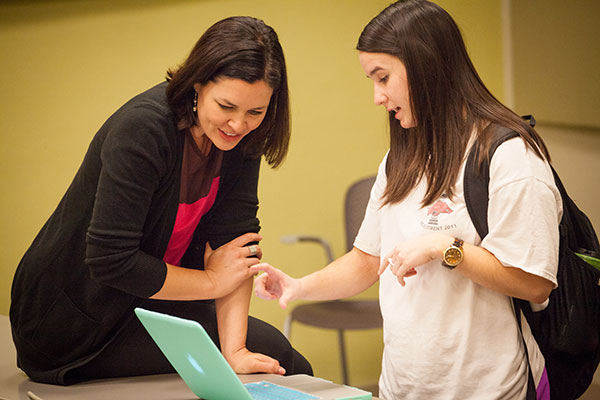
Noah Pittman, Honors College assistant dean of enrollment, has reviewed more than 3,000 Honors College fellowship applications. Photo by Shelby Gill.
I’ve reviewed and ranked close to 7,000 Honors College fellowship applications in the past 16 years and every year, I spend a lot of time debating with my colleagues whether we should favor Student X (great transcript, only extracurricular involvement is a lame 1990s cover band) over Student Y (18-year old humanitarian who started a non-profit organization, but had the audacity to make a C+ in AP Calculus BC).
For years, I’ve had high school students ask me what will help them stand out on a scholarship application. Here’s the thing: there is no magic elixir to nailing a top-notch application. We admissions counselors like to think we have this down to a science, but in reality, there are more than a few shades of gray when it comes to determining who gets a scholarship from an institution. That said, here are some quick tips that could help you be a more successful applicant:
Tip #1 – When it comes to college resumes, always assume that the reader does not know you.
For most students, the resume is the perfect opportunity to list your achievements and extracurricular activities from high school. The problem students run into, though, is that they simply offer a list. Let’s take the example of an activity that may be found on John Doe’s resume.
Student Council Treasurer
Ok, this sounds impressive, but that leaves soooo many questions in the mind of a reviewer. Student council is obviously a leadership position, but what did you actually accomplish? We all know the people who took student council seriously in high school, and we also know the students who just wanted the free ticket to the homecoming dance that came with joining. Try this:
Student Council Treasurer
As treasurer, I managed a $5,000 budget for the student council. Working with the president and our faculty advisor, we allocated the money to a number of student-led programs, including Football Homecoming Week, National Honor Society Induction, and our Game of Thrones-themed Senior Prom. Including meetings, I spend about 5-7 hours a week working on Student Council.
See the difference? This is your opportunity to not only list those activities, but to also demonstrate your actual contributions to an organization.

Proofread your essay a number of times, and ask a teacher to review it as well. Photo by Russell Cothren.
Tip #2 – Take your essays seriously …
Each year, I have parents approach me at a college fair to tell me about a “perfect student with a 34 ACT, 4.4 weighted GPA” they know who did not get one of the top scholarships at the University of Arkansas the previous application cycle. Most of these stories are apocryphal, but on a few occasions, I had to bite my tongue and not say, “Yes, that student had a great profile, but I remember reading his essay. It was awful.” In too many cases, top students feel like they don’t need to take a college application seriously, especially if it’s for an institution outside of the Ivy League. That’s an incredibly misguided approach. As high-achieving students continue to increase the number of college applications they submit each year, schools like mine often have more than enough qualified students for top awards. At the high end of applicants (let’s say the Top 5% of applicants based only upon transcripts and standardized test scores) it is difficult to compare academic profiles because each of these students are more than likely going to be incredibly successful in college. Since this is the case, essays and resumes carry significant weight, especially when determining a top scholarship.
Tip #3 – … but watch the language in your essays.
Knowing that the essays are important and relatively short, many students try to cram every five-syllable word and potentially groundbreaking thought into the space allowed so they can come off as erudite (see what I did there?). For many 18-year olds, regardless of their intellect, this type of writing comes off as clumsy prose. When I’m reading application essays, in too many cases I envision the poor student frantically typing on a keyboard with a leather bound thesaurus propped up against the monitor. There are two key things we look for in an essay: 1) students actually addressing the question posed and 2) clarity. If you can’t meet these two simple criteria, your essay on how you plan to completely eradicate poverty in Latin America before you turn 30 will not carry as much weight with a scholarship committee as it could have.
Tip #4 – Really think about who will write a good letter of recommendation for you.
If you are required to have letters of recommendation submitted on your behalf for an application, you should always seek teachers who can go above and beyond establishing that you’re an “intelligent young person” who is “very responsible.” I can look at a transcript and figure out real quickly if you should be considered intelligent and very responsible. You would be surprised how many letters I read that only address these two areas. You should therefore seek teachers who can go above and beyond this in a letter. Think of finding teachers who can address at least some of the following attributes about you:
• Work ethic/”Grit”
• Creativity/Critical Thinking Skills
• Communication Skills
• Leadership Skills
• Empathy/Ability to work well with others
And so on. Intelligence is obviously important, but the qualities listed above are all soft skills that will help you be successful not only in college, but for the rest of your life.
Also, if your teacher is looking for guidance on how to prepare a letter of recommendation, feel free to share this blog post on the subject.
Tip #5 – At the end of the day, your transcript is still the most important component of your application …
I know this sounds counter-intuitive after the last few tips, but please remember that it’s important to take your academics seriously. Most college administrators agree that one of the best predictors of college success is a strong high school GPA that was achieved over the course of a relatively difficult course load. Not only is the GPA a sign of intelligence –– it also reflects a student’s work ethic. A strong application essay is going to do very little for a student who did not take his/her academics seriously in high school.
Tip #6 – … but don’t be too hard on yourself.
Want to know a secret? I don’t have very fond memories in high school. Oh yes, I was very successful in a lot of areas both inside and outside the classroom, but throughout my time in high school, I was incredibly stressed and was not the most pleasant person to be around. Nevertheless, I had a pretty strong college application and was rewarded with admission into some very good schools. Was I really happy, though? I honestly don’t have a clear answer.
Almost weekly, I meet very intelligent students who have stretched themselves too thin, all in the chase to get into the best college possible. You may even be one of those students. Although it may be a little too late to find that perfect balance in high school, my advice is to make a concerted effort to do so once you’re in college. In my case, I continued to work hard, but I was able to find much better balance between academics and my social life. Once I had a good balance, I was able to learn and retain so much more in my classes. I was also able to form much stronger relationships with both my classmates and my professors. My experience was so fantastic, I even chose to pursue a career in higher education administration of all things, one of the best decisions of my life. Am I happy now? Yes, and finding that balance in college was the first important step.

Fellowship finalists are asked to visit campus for Fellowship Weekend, where they meet current fellows and interview with Honors College faculty. Photo by Shelby Gill.
Tip #7 – If you’re lucky enough to earn one, value your scholarship.
When we offer a scholarship, we are in a sense making a calculated bet on your ability to succeed at our institution. Once you step foot on our campus, we have a vested interest in your success not just during your four years, but for the rest of your life. Take this responsibility seriously. College should be fun regardless of where you go, but at the end of the day, it’s your job to get a quality education that will set you up for success the rest of your life. Essentially, prove to us that we made the correct choice in offering you an award over another worthy candidate.
Well, that’s my two cents on applying for scholarships – I hope they’re helpful as you apply for scholarships and fellowships that will help you pay your way through college. Good luck!
Want to learn more information about how to apply for scholarships? Be sure to listen to KUAF’s interview of Dr. Pittman on the subject. There’s also a YouTube playlist available where Dr. Pittman breaks down each section of the application.
